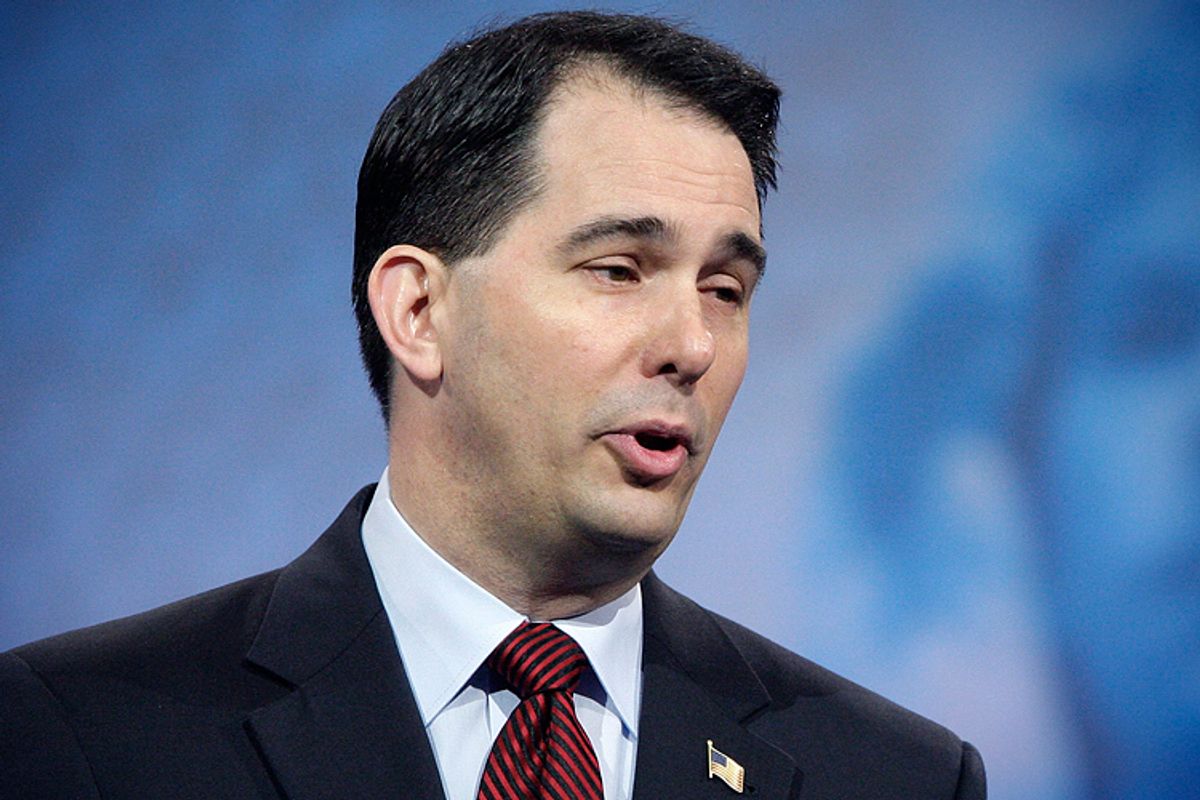There are so many GOP presidential hopefuls for whom a path to winning the 2016 nomination seems rife with obstacles. Jeb Bush has money but has been out of the game for a while, and also loves immigration reform and Common Core. Chris Christie ... something about a bridge? Ted Cruz has what we may call a narrow, if vociferous, appeal, even among Republicans. Rand Paul doesn't love constant war enough; Marco Rubio is nothing. As we all know, Romneymentum is sweeping the country with a fervor unlike anything previously recorded in political history, but for whatever reason, he seems intent on not giving it another go.
This is all great news for Wisconsin Gov. Scott Walker! Walker has everything Republicans want in a presidential nominee. Executive experience. A record of right-wing accomplishment in a blue state and fighting hard to save his hide in the backlash. And most important, a diverse coalition of supporters, ranging from white suburbanites to white suburbanites, and then back to white suburbanites again.
The New Republic's Alec MacGillis writes about Walker at length in the magazine's latest cover story. And it shows, at least to us, that Walker represents a great test of the crumbling national GOP foundation's ability to push through a presidential victory. If he's able to become president, the reconfigured appeal the GOP needs to be nationally competitive again will at least be delayed. If he isn't, then the party may learn once and for all that time's up.
Walker's base is a lot like that of Republicans in other states: whiter rural and suburban parts that go to battle with more heavily African-American and Hispanic cities. As MacGillis explains, though, the racial imbalance in Wisconsin, specifically in and around Milwaukee, is almost total. "Today, less than 2 percent of the WOW counties’ population," MacGillis writes of the three most populous counties surrounding Milwaukee, "is African American and less than 5 percent is Hispanic. According to studies by the Brookings Institution and Brown University, the Milwaukee metro area is one of the top two most racially segregated regions in the country."
The WOW counties were voting Republican at levels unseen in other Northern suburbs; one needed to look as far as the white suburbs around Atlanta and Birmingham for similar numbers. The partisan gulf between Milwaukee and its suburbs in presidential elections has now grown wider than in any of the nation’s 50 largest cities, except for New Orleans, according to the Journal Sentinel series.
And it's those whiter "WOW" counties (Waukesha, Ozaukee and Washington) that propelled Walker to victory in the 2010 gubernatorial primary, 2010 general election and 2012 recall election. "The final vote," in the 2012 recall, "showed his suburban base had become more hypercharged than ever. Turnout in Ozaukee and Waukesha counties surpassed 70 percent of voting-age adults, astonishing for a June election; he won some WOW communities with more than 80 percent of the vote."
Much of Walker's appeal in the suburbs stems from the loyal support he receives from a couple of popular right-wing talk radio hosts stationed there. These talk radio hosts, as MacGillis explains, have a proclivity for making what one might call "racially charged statements" regarding the citizens of Milwaukee, with whom the suburbanites are waging political war. And, for the most part, winning.
But in the two years since the recall, his actions have only deepened the rift between the city and the suburbs. Milwaukee has been badly hurt by the state funding cuts that accompanied the public-employee union emasculation. City leaders are angry that the state is withholding from Milwaukee much of the settlement award for fraudulent mortgage practices in the city. They feel betrayed by a new state law overturning Milwaukee’s city residency requirement for police officers and firefighters. Walker also eliminated Milwaukee’s regional transit authority, undermining efforts to improve the city’s woeful bus access to suburban workplaces. And in refusing to accept the Affordable Care Act’s Medicaid expansion, he cut thousands of Milwaukee residents from the program’s rolls. City officials are especially livid about Walker’s signing of a strict voter-I.D. law and a law sharply curtailing early voting, when thousands of Milwaukeeans cast their ballots. A judge overturned the voter-I.D. law in April, but the early voting cutbacks stand. Given how crucial turnout has become in the state, the intent was plain.
Can #ScottWalker be nationalized? Among the Wisconsin state politics watchers MacGillis interviews, there's some concern. He's not much of a character or a personality, and he's protected by an insular and vocal right-wing media. At worst, he could be a 2016 Tim Pawlenty: solid on paper, but a shell of a candidate and an inevitable backup V.P. pick. (Before all of this, of course, he will need to win his second term reelection this year, which won't be easy.)
At best? Oh, at best, Scott Walker is a perfect fit for the current iteration of the GOP: beloved by right-wing media (and as David Brat's upset of Eric Cantor in VA-07 proved, conservative talk radio's power to influence GOP primaries is still somehow underrated), beloved by white voters, beloved by religious conservatives, beloved by the Koch brothers, beloved by anti-union economic types.
Walker may just represent the last best hope for the current, struggling iteration of the GOP, in which maximized support among the base is the only game it can play, preferably on a titled field in which voter ID laws screen out the Enemy's loyal voters. He may be the party's most legitimate "50 percent plus one" candidate, one whose appeal is strong to some but not exactly open to a broadening. The only problem is this vehicle hasn't done much to show, nationally, that it will ever have enough juice to break past 48 percent again.

Shares